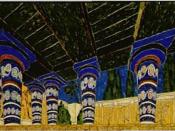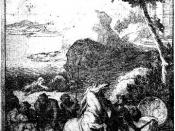The Aristotelian tragic hero is defined as a "lifelike" person who demonstrates both good and bad qualities through speech and action in a consistent manner. Moreover, the tragic hero, due to a personal error in judgment or tragic flaw, is the cause of the tragedy in a play. In Jean Racine's "Phaedra", three characters exhibit these characteristics; however Phaedra most responsible for the calamity making her the tragic heroine.
The tragic hero manifests both good and evil characteristics. Phaedra, the stepmother of Hippolytus, demonstrated her poor qualities when she had him banished because she was in love with him and could not carry on with him near her. Phaedra's cruelness is also revealed when she conspired with Oenone to "accuse him first of that which he might charge you with today" (p. 385), implicating Hippolytus instead so that she would not be punished for her incestuous misconduct.
Phaedra also demonstrated jealousy when she learned that Hippolytus was in love with another, proclaiming "Aricia must die. Her odious house Must once more feel the anger of my spouse." (p. 394). However, Phaedra is not completely diabolical because she did show remorse for loving Hippolytus, and she accepted that her emotions and actions were ignoble. Likewise, she confessed her evil deeds to her husband, "Hear me, my lord. I have but little time. I was the lustful and incestuous one who dared desire your chaste and loyal son" (p. 402). Ultimately she committed suicide because of the guilt she suffered because of dishonor.
The tragedy in Phaedra is Phaedra's suicide, Hippolytus being slain by a monster, and Theseus and Aricia left in anguish. Each character has a tragic flaw, or hamartia, that carries the plot along. Although both Theseus' and Hippolytus' hamartia expedited the tragic...


